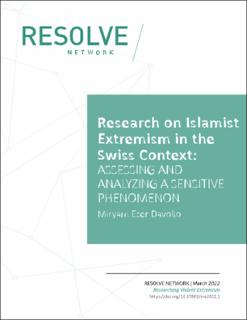Please use this identifier to cite or link to this item:
https://doi.org/10.21256/zhaw-25058Full metadata record
| DC Field | Value | Language |
|---|---|---|
| dc.contributor.author | Eser Davolio, Mirjam | - |
| dc.date.accessioned | 2022-06-01T15:54:17Z | - |
| dc.date.available | 2022-06-01T15:54:17Z | - |
| dc.date.issued | 2022-03-24 | - |
| dc.identifier.issn | 2766-9955 | de_CH |
| dc.identifier.uri | https://digitalcollection.zhaw.ch/handle/11475/25058 | - |
| dc.description.abstract | Researching and addressing “radicalization” within smaller European countries is particularly challenging. Not only is it incumbent that research and approaches take into account analyses, findings, strategies, and measures from other contexts, they must also work to craft their own national understanding of the extent and nature of the phenomena and approaches to address it. This chapter discusses the author’s reflections on experiences conducting two studies on violent jihadist1 radicalization in Switzerland at a time of heightened concern over potential jihadist violent extremist threats.2 In doing so, the chapter focuses on the ethical and methodological challenges specific to the Swiss context, as well as issues impacting research on violent extremism more generally. The two studies—both of which the author served a role in—additionally navigated the tension inherent in researching a topic of heightened public interest and media coverage. Given the context and the focus on jihadist extremism specifically, the research processes themselves carried risks, including the risk of inadvertently enhancing social polarization and Islamophobia in the very act of examining a phenomenon focused on minority populations in a small country. Methodological challenges additionally complicated the research, but also provided opportunities brought on by the diverse backgrounds of the researchers in terms of their disciplines, the nature of their work on violent extremism, and their sociocultural and linguistic backgrounds (from German-, French- and Italian-speaking parts of Switzerland). The researchers also faced demanding timelines, undertaking research during a time when concerns over a possible terrorist attack were heightened, placing additional pressure on the researchers in charge of making decisions focused on both handling emergency and ethical concerns in an accurate, institutionally prescribed manner and addressing societal concerns pragmatically. Additional issues specific to the Swiss context included: (1) the challenge of managing and safeguarding data and anonymity in a country with a relatively small population; and (2) gaining and maintaining access to the trust of research participants. This chapter reflects on approaches to mitigate these challenges and examines the research process in retrospect from the perspective of the author. It concludes with recommendations based on the research projects focused on mitigating potential risks, particularly those to research participants and their associated demographic populations, when researching violent extremism and other sensitive topics in the Swiss context. While the chapter focuses on research conducted on violent extremism in Switzerland, its insights may have utility in addressing similar challenges elsewhere. | de_CH |
| dc.language.iso | en | de_CH |
| dc.publisher | RESOLVE Network | de_CH |
| dc.rights | Licence according to publishing contract | de_CH |
| dc.subject | Extremism | de_CH |
| dc.subject | Prevention | de_CH |
| dc.subject | Extremismus | de_CH |
| dc.subject | Prävention | de_CH |
| dc.subject | Switzerland | de_CH |
| dc.subject | Schweiz | de_CH |
| dc.subject.ddc | 303: Soziale Prozesse | de_CH |
| dc.title | Research on Islamist extremism in the Swiss context : assessing and analyzing a sensitive phenomenon | de_CH |
| dc.type | Working Paper – Gutachten – Studie | de_CH |
| dcterms.type | Text | de_CH |
| zhaw.departement | Soziale Arbeit | de_CH |
| zhaw.organisationalunit | Institut für Vielfalt und gesellschaftliche Teilhabe (IVGT) | de_CH |
| zhaw.publisher.place | Washington, D.C. | de_CH |
| dc.identifier.doi | 10.37805/rve2022.1 | de_CH |
| dc.identifier.doi | 10.21256/zhaw-25058 | - |
| zhaw.funding.eu | No | de_CH |
| zhaw.originated.zhaw | Yes | de_CH |
| zhaw.author.additional | No | de_CH |
| zhaw.display.portrait | Yes | de_CH |
| Appears in collections: | Publikationen Soziale Arbeit | |
Files in This Item:
| File | Description | Size | Format | |
|---|---|---|---|---|
| 2022_Eser_Research-islamist-extremism-swiss-context_resolve.pdf | 543.1 kB | Adobe PDF |  View/Open |
Show simple item record
Eser Davolio, M. (2022). Research on Islamist extremism in the Swiss context : assessing and analyzing a sensitive phenomenon. RESOLVE Network. https://doi.org/10.37805/rve2022.1
Eser Davolio, M. (2022) Research on Islamist extremism in the Swiss context : assessing and analyzing a sensitive phenomenon. Washington, D.C.: RESOLVE Network. Available at: https://doi.org/10.37805/rve2022.1.
M. Eser Davolio, “Research on Islamist extremism in the Swiss context : assessing and analyzing a sensitive phenomenon,” RESOLVE Network, Washington, D.C., Mar. 2022. doi: 10.37805/rve2022.1.
ESER DAVOLIO, Mirjam, 2022. Research on Islamist extremism in the Swiss context : assessing and analyzing a sensitive phenomenon. Washington, D.C.: RESOLVE Network
Eser Davolio, Mirjam. 2022. “Research on Islamist Extremism in the Swiss Context : Assessing and Analyzing a Sensitive Phenomenon.” Washington, D.C.: RESOLVE Network. https://doi.org/10.37805/rve2022.1.
Eser Davolio, Mirjam. Research on Islamist Extremism in the Swiss Context : Assessing and Analyzing a Sensitive Phenomenon. RESOLVE Network, 24 Mar. 2022, https://doi.org/10.37805/rve2022.1.
Items in DSpace are protected by copyright, with all rights reserved, unless otherwise indicated.